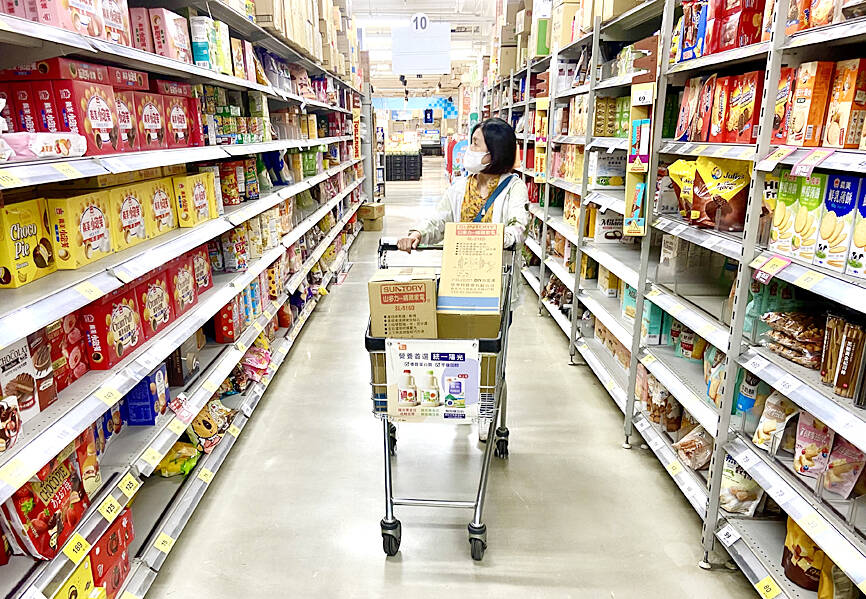Singapore-based DBS Bank yesterday raised its forecast for Taiwan’s consumer price index to 2.2 percent for this year from the 1.7 percent increase it predicted previously, as the nation’s economy continues to rebound while inflation risks mount.
“There is a shift in risk balance from growth to inflation, prompting considerations for policy tightening,” DBS Bank senior economist Ma Tieying (馬鐵英) told an online news conference.
Inflation is expected to remain elevated this quarter, with services inflation likely to be the prime driver, reflecting electricity price hikes and the pass-through effect from them, Ma said.

Photo: CNA
The central bank last month unexpectedly raised its policy rate by 0.125 percentage points in a bid to curb expected inflation following an 11 percent increase in electricity rates this month.
The across-the-board electricity rate adjustments are expected to drive inflation up by 0.27 percentage points this year, including a direct impact of 0.09 percentage points and an indirect impact of 0.18 percentage points, the central bank has said.
However, the hikes would not reverse Taiwan Power Co’s (台電) loss-making status, meaning more rate increases might be necessary later this year, Ma said.
“Electricity price reforms remain plausible over the long term, considering Taiwan’s imperative shift toward [more expensive] green energy, alongside challenges posed by climate change and energy security,” she said.
DBS Bank also trimmed its GDP growth forecast for Taiwan this quarter to 4.2 percent from 4.3 percent to reflect the economic effects of a massive earthquake that struck the east coast on Wednesday last week.
Thankfully, the quake’s epicenter was more than 100km from key manufacturing centers such as Hsinchu, Taichung and Tainan, while the inventory ratio in Taiwan’s semiconductor and overall manufacturing sector has remained above the historical par of 1.0, suggesting that companies have sufficient inventories to cope with the minor disruptions, Ma said.
DBS stood by its prediction of a moderate recovery in exports this quarter, when a cyclical upturn in the global semiconductor sector would lend support to Taiwan’s exports, she said.
As US technology giants ramp up artificial intelligence (AI) infrastructure to accommodate booming computational demand, there would be a surge in the need for high-performance logic chips, high-capacity servers, storage and memory chips, for which Taiwanese firms are the world’s leading contract makers, Ma said.
In addition, the emergence of conversational AI products could accelerate the replacement cycles for PCs, smartphones and other devices, she said, adding that local firms are also major suppliers of electronics used in such gadgets.
DBS retained its GDP growth forecast for Taiwan this year at 3.5 percent.

Intel Corp chief executive officer Lip-Bu Tan (陳立武) is expected to meet with Taiwanese suppliers next month in conjunction with the opening of the Computex Taipei trade show, supply chain sources said on Monday. The visit, the first for Tan to Taiwan since assuming his new post last month, would be aimed at enhancing Intel’s ties with suppliers in Taiwan as he attempts to help turn around the struggling US chipmaker, the sources said. Tan is to hold a banquet to celebrate Intel’s 40-year presence in Taiwan before Computex opens on May 20 and invite dozens of Taiwanese suppliers to exchange views

Application-specific integrated circuit designer Faraday Technology Corp (智原) yesterday said that although revenue this quarter would decline 30 percent from last quarter, it retained its full-year forecast of revenue growth of 100 percent. The company attributed the quarterly drop to a slowdown in customers’ production of chips using Faraday’s advanced packaging technology. The company is still confident about its revenue growth this year, given its strong “design-win” — or the projects it won to help customers design their chips, Faraday president Steve Wang (王國雍) told an online earnings conference. “The design-win this year is better than we expected. We believe we will win

Chizuko Kimura has become the first female sushi chef in the world to win a Michelin star, fulfilling a promise she made to her dying husband to continue his legacy. The 54-year-old Japanese chef regained the Michelin star her late husband, Shunei Kimura, won three years ago for their Sushi Shunei restaurant in Paris. For Shunei Kimura, the star was a dream come true. However, the joy was short-lived. He died from cancer just three months later in June 2022. He was 65. The following year, the restaurant in the heart of Montmartre lost its star rating. Chizuko Kimura insisted that the new star is still down

While China’s leaders use their economic and political might to fight US President Donald Trump’s trade war “to the end,” its army of social media soldiers are embarking on a more humorous campaign online. Trump’s tariff blitz has seen Washington and Beijing impose eye-watering duties on imports from the other, fanning a standoff between the economic superpowers that has sparked global recession fears and sent markets into a tailspin. Trump says his policy is a response to years of being “ripped off” by other countries and aims to bring manufacturing to the US, forcing companies to employ US workers. However, China’s online warriors